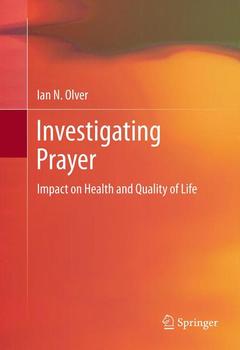Description
Investigating Prayer, 2013
Impact on Health and Quality of Life
Author: Olver Ian
Language: English
Subjects for Investigating Prayer:
150 p. · 15.5x23.5 cm · Paperback
Publication date: 10-2012
150 p. · 15.5x23.5 cm · Paperback
Description
/li>Contents
/li>Biography
/li>Comment
/li>
Chapter 1. What is Prayer and Why Study it?.- Chapter 2. Studies of Prayer as a Complementary Therapy.- Chapter 3. A Theological Reflection on Prayer.- Chapter 4. The Relationship Between Spiritual Wellbeing and Quality of Life.- Chapter 5. A Randomized Blinded Study of Intercessory Prayer in Patients with Cancer.- Chapter 6. The impact of the study on the trials team.- Chapter 7. Response to our Study of Prayer.- Chapter 8. What next?

